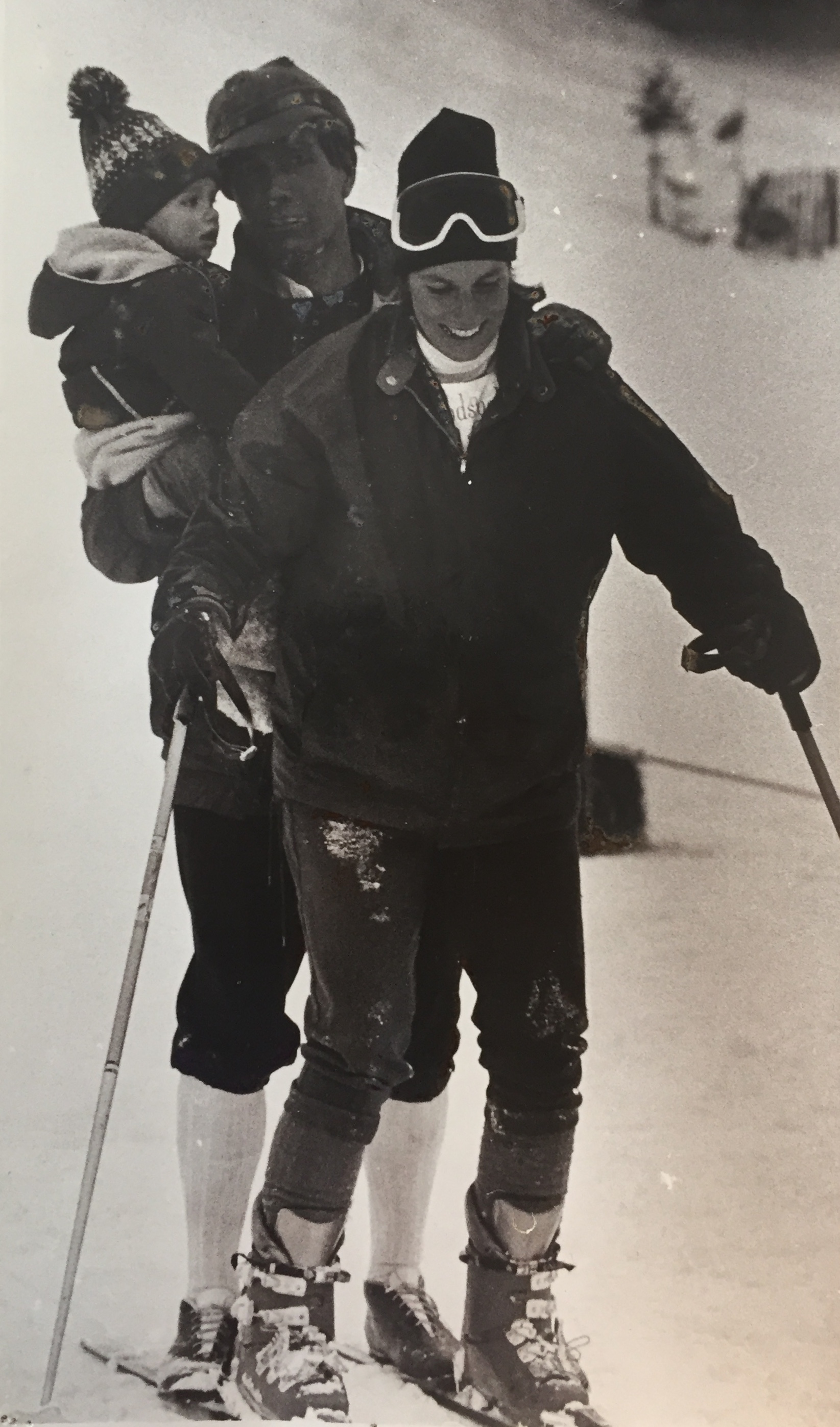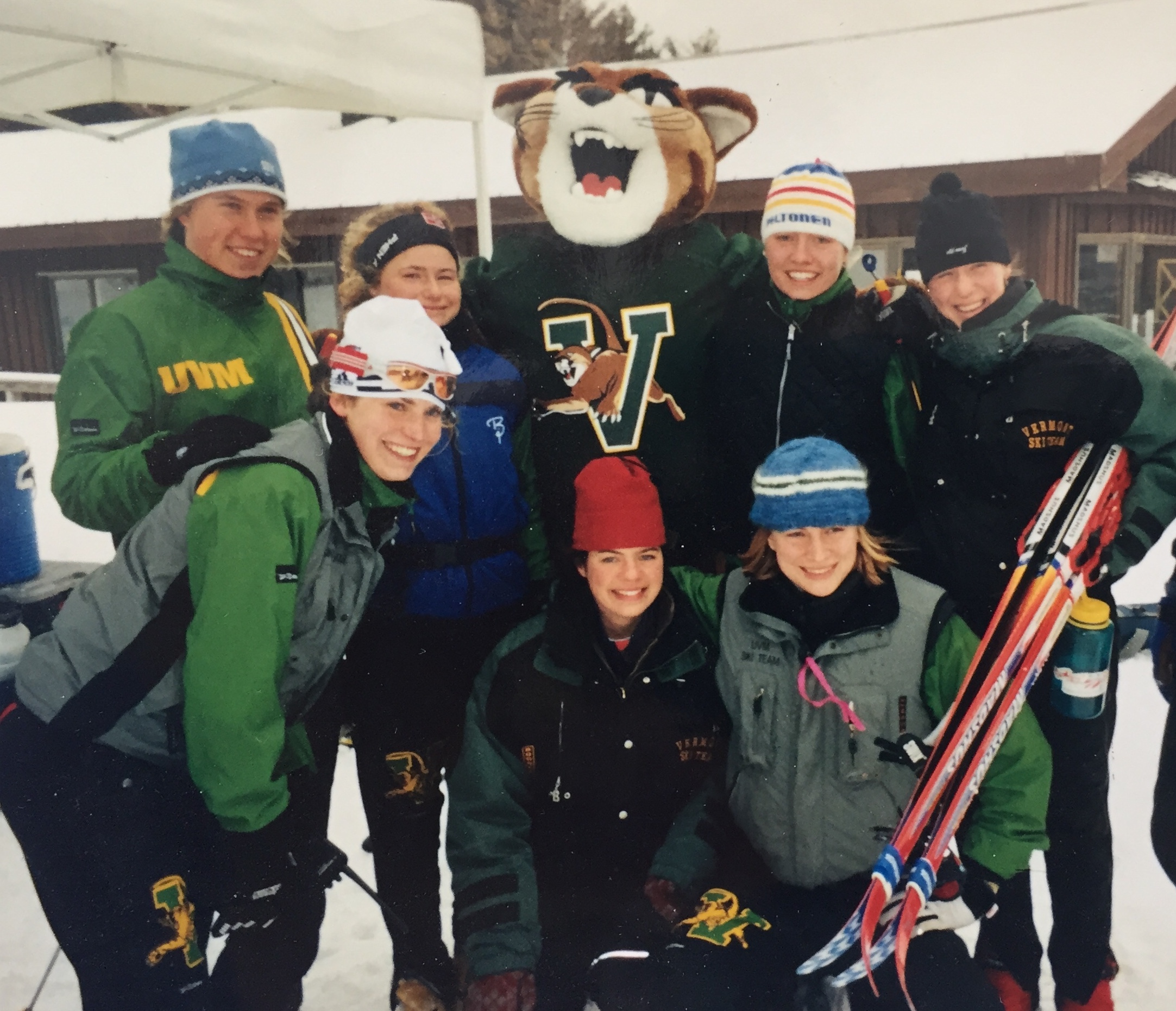It’s Wednesday, so you know what that means!
I like to use the Wellness Wednesday posts to introduce you to members of the legal profession who make sure to make time for non-legal, non-lawyerly things. As the VBA’s Jennifer Emens-Butler says, “pursuits of happiness.” Links to my prior posts on lawyers and their non-lawyerly interests appear at the end of today’s blog.
Today, I’d like to introduce you to Molly Gray.

Molly is an assistant attorney general. She’s also a top-notch cross-country skier who grew up on a working farm. Molly was kind enough to agree to answer questions that are loosely related to her background, legal ethics, and attorney wellness. All mistakes and typos are mine, not Molly’s.
MK:Thank you for doing this! Like me, you grew up in Vermont. Unlike me, it wasn’t near the Burlington airport. Tell us a little about life as Molly Gray before you went to law school?
MG: Thanks for reaching out! Where to begin, I grew up on a farm. A real working vegetable, fruit and dairy farm in Newbury on the Connecticut River. I was born on the farm. Yes, in the farm house in the early 1980s. My parents retired from competitive ski racing and shifted all that competitive energy to farming. They have an indomitable love of labor, Vermont and being outside. The skiing, at least, was contagious. I attended Oxbow High School (that would be the Oxbow “Olympians”) and a ski academy in southern Vermont, the Stratton Mountain School. All the skiing and probably farming in those early years, led to a scholarship to ski for the University of Vermont. I am extremely fortunate. After four years of racing, a budding interest in government, law, and international relations drove me, like my parents, to zero in on something new; an eventual legal career. That being said, I was 22 and had never really left Vermont! Ultimately, I attended Vermont Law School, but there was quite the eye-opening journey in getting there several years later
(MK Note: in 2015, VTDigger featured Molly’s parents’ farm)

(Molly’s parents & her brother)
MK: Very interesting! So much information. But first things first. I have roots in the Upper Valley. My mom grew up in Bradford and was a Bradford Academy Admiral. In my job, I often preach a lawyer’s duty of competence. As a Newbury native, what is the only competent way to pronounce your home town?
MG: You had mentioned the Upper Valley connection. You are aware then of the friendly rivalry between Bradford folks and the community in Newbury. Frank Bryan once said Newbury is the town that time forgot. That’s probably about right. It is “New Bury.” It’s an “ury” instead of an “erry” and the “B” is right there with the “New.” “NewBury”
MK: Professor Bryan was my favorite professor at UVM! Speaking of UVM, you skied for the Cats. What were your events? Also, I don’t think people realize how amazing it is to receive a ski scholarship to UVM. Only 3 schools have won more national championships. That means that UVM is to college skiing what Duke is to men’s college basketball. Was UVM your dream all along?
MG: What a great time to talk about skiing – the University of Vermont Ski Team just hosted NCAA’s and came in second behind Utah. Go Cats! I will quietly admit that there was a short-lived and naive dream of skiing for CU Boulder but the then Director of Skiing, Chip LaCasse, to his credit, was recruiting locally (rather than internationally) and gave a handful of Vermonters opportunities of a lifetime.
I can’t comment on Duke basketball, but UVM skiing is not for the faint of heart. The nordic ski team trained every day, some days twice per day, with the exception of Monday, from August to March and all summer long. Races ranged from 5kms to 20kms, both classic and skate, with the occasional relay or sprint relay. Although skiing is an individual sport, in college you race as a team. Each Thursday we would load up the vans and drive to races or “carnivals” hosted by colleges across New England. Alpine and nordic team results would be combined after two days of racing with one collegiate team coming out on top. As you might imagine, there were UVM traditions to be upheld and no shortage of rivalries.
I raced all four years (not always fast) and served as a captain. Above all my teammates became some of my closest friends and remain so to this day.
MK: Colorado tries its best to beat UVM! That would’ve been a conflict of interest! #ThisIsVermont The Buffs loss was our gain.
All kidding aside, great answer! A few things.
First, the work required. Your success as a skier didn’t come by accident. The dedication to the training. I can’t imagine the time commitment! I suspect that growing up on a working farm was like skiing. Both probably involved lots of hard work, at hours that most people weren’t up, in weather conditions that kept most people inside. Did lessons you learned on the farm help with being a competitive skier? Did both (or either) help you to tackle the workload that is the first year of law school?
MG: Thanks! Although I have to say this interview is making me sound super tough and disciplined. I’m not! I still struggle with an early morning workout. To answer your question though, I do think growing up on a farm instilled an inevitable attraction to hard work and being outside. Farming, and having parents who do not shy away from a little healthy competition, probably left me and my siblings constantly self-imposing physical challenges–why carry one flat of strawberries when you can carry 2 or 3 or by end of summer 4. Equal parts training and efficiency. Without question, managing school work while ski racing (or vice versa) at UVM was great preparation for law school. I also came to appreciate, as I am sure many in the legal community do, that the most productive, “clear-headed” work, comes in the hours after a good workout.
MK: Clearing the head. That’s wellness! I’m with you though: as much as I love the idea of sunrise runs that I finish before work, those early wake ups are NOT fun. But, speaking of wellness, do you still ski? In legal ethics, I often talk about conflicts. For some athletes, the conflict that exists between doing something for enjoyment vs. doing it as a competitor is too much to overcome. So, once they stop competing, they give up the sport. Having competed at the highest levels, do you ever find it difficult to ski for the pure enjoyment of it?? Conversely, I still love to run even though I’m not as fast as I used to be. As much as I love it, there are times where what I wouldn’t give for just one more race as good as I once was. So, even if you’re out enjoying a beautiful & relaxing day on the trails, does your mind ever wander to that feeling you used to have as you waited at the starting line in Green & Gold?
MG: This is a great question! I’ll admit I still have the occasional racing dream. It normally starts out with feelings of incredible and surprising speed and “I’ve still got it” followed by profound and mortifying exasperation. When I was racing, I loved sprint races — 1km qualification, followed by the top 30 or so skiers racing in heats of 5 or 6 with 2 or 3 racers progressing from each heat to a final heat. It is a more tactical, high-energy and spectator-friendly race. In my dream, I can “fake it” for the qualification round.
Some athletes learn to ski in order to race. Although my parents were competitive ski racers, to his credit, my father taught us to ski for the love of skiing. Racing came later, and random sprint dreams aside, I crave a good ski far more than the competition.
MK: Love the dreams! Mine are often daydreams as I’m running. The body & brain re-living the feeling of a PR or great race. I want to go back to something you said earlier. You mentioned the life-long friendships with your teammates. There’s something about the shared experience that forges bonds – not only among teammates, but among competitors. My closest friends are people I met thru basketball. My “attorney wellness” is nourished by those relationships outside the legal profession. Do you feel the same?
MG: Absolutely. This is by no means a dig at our profession, I am happy to run or ski with fellow attorneys but sometimes you have to be clear about why you are doing what you are doing. Basketball, skiing, running, should be cathartic. Inviting colleagues does not always make it so. Inevitably, you start talking about work. There have to be some ground rules!
I recall the first winter I did not ski race and did not have teammates. It was 8 months after graduating from UVM, I moved to Washington, D.C. to work for Rep. Peter Welch. I had not figured out the work-life balance and it was the first winter without racing or a true winter. My body was miserable and confused. On the advice of a friend, I joined a running club “Fleet Feet Sports” in Adams Morgan. A couple of the runners became close, non-work, running friends. We trained for the USMC marathon together and built a unique bond that was cathartic, supportive, competitive and limited to our non-work identities. It was terrific. I have lived in a lot of different places and try to forge these bonds.

(Molly, some of her UVM teammates, and Rally Cat)
MK: I like those bonds. As lawyers, we seem to focus on discrete practice areas, tending to bond with others in the same area. How’d you end up focusing on Nordic vs. Alpine? Also, once we pick a practice area, we seem not to venture to another. Do you downhill ski?
MG: I like the comparison to practice areas. I keep both sets of equipment in my car (just in case…). I learned to alpine ski at one of my favorite spots in Vermont, “Northeast Slopes” in East Corinth. It’s one of the oldest rope tows in the United States, and still operating today. One of Vermont’s hidden treasures. Why nordic? My mother was an alpine racer (an adrenaline chasing downhill racer) and my father was a nordic racer. Ultimately, nordic won over, but the practice areas are ever evolving.
MK:The T-Bar! We used to drive by the Slopes on our way to Bradford! Speaking of “ever evolving,” can we talk about training equipment for a moment? I often speak and blog about tech competence. A few years ago, I was running down Spear Street. The UVM ski team was coming other way. It was summer, so they were doing dry land training. They had these contraptions that looked like giant elliptical machines! I was fascinated. Did you ever train on one of those?
MG: Roller skis! I haven’t put on a pair since 2006. Hundreds, likely thousands, of miles banked on those “contraptions”. I hope the design has improved. In my day they took a lot of balance, and although they were the closest thing to skiing (literally, short skis with wheels on them), they contributed to some pretty epic wipeouts. No breaks! While at UVM, we did an annual 50km or so fall training “ski” through Underhill, Cambridge and up to Fairfax. All told, roller skis do provide a unique way to see some beautiful parts of Vermont.
MK: Yikes! Concrete ain’t exactly fresh powder! I do not wear headphones on my runs, even the 20 milers. Other runners think I’m nuts. You are out for a long ski by yourself. Headphones or not?
MG: Headphones? No. You’re out in the woods and its beautiful. Enough said.
MK:Runners should take heed! Ok, circling back for a moment. You mentioned an eye-opening journey from your last days at UVM to your first days at VLS. Can you give us some highlights of the journey?
MG: I really don’t want to bore your readers to death. In a nutshell, upon graduating from UVM in 2006, I worked as a Congressional campaign scheduler for longtime attorney and state senator Peter Welch. Over a 3-month period, Welch visited all 251 towns (and gores) in Vermont. Ultimately (and I would like to think the 251 “marathon” had something to do with it), Welch won that November and I was offered a job in Washington. A whole crew of Vermonters were hired. It was a tremendous honor to be part of that. Eventually, and because the world was calling, I went on to work for the Geneva-based International Committee of the Red Cross (ICRC). As a Congressional Affairs advisor in the Washington office, I worked with US lawyers and policymakers on international law issues including those arising at the detention facility at Guantanamo Bay, in Iraq and Afghanistan, and with the emerging use of drones. I travelled a lot during that time and led missions to Haiti, Uganda, the Democratic Republic of the Congo, the former Yugoslavia and Georgia. It was eye-opening to say the least! A far cry from Vermont, and as they say, “you can take a girl out of Vermont, but …,” by 2011 I was ready to come home and get cracking on law school.
MK: Wow! Traveling the world to help people. You did Vermont proud! And we’re lucky to have you back. Okay, who are the 2 or 3 other skiers, living or dead, who you’d pick to be on your “dream relay team?”
MG:
- Bill Koch – A Vermonter and the first American ever to win a medal at the Olympics (Innsbruck ’76) in cross-country skiing. For all intents and purposes, he also invented the “freestyle” or “skate” technique.
- Jessie Diggins – Not a native Vermonter (I’m all about inclusivity) but she trains here now, and second American ever to win a medal at the Olympics (PyeongChang ’18) in cross-country skiing. She is an awesome ambassador for the sport and role model for girls.
- Bob Gray– Yep, going with my old man. I’ll be honest, there is not a person on the planet who loves the sport as much as he does. All heart.
MK: Good job getting Dad in there! I read in the Valley News that he’s still kicking butt!

(Molly and her Dad)
MK: Earlier you mentioned classic vs skate skiing. With the duty of competence in mind, do you have any thoughts on a lawyer who shows up at Trapp Outdoor Center, rents classic skis, then proceeds to try to skate ski all over the property?
MG: Oh, no. Such a brave lawyer. That would be comparable to arriving criminal court and attempting to litigate a civil claim. I’m always happy to advise on equipment and better yet meet for a ski and especially at Trapp’s.
MK: Molly – that is the perfect closing argument in your case to disbar me from cross-country skiing: “Kennedy is no Bill Koch: it’s like he’s a lawyer who brought a civil claim to criminal court.”
Thank you Molly Gray! Hope some people are inspired to get out and enjoy these last few weeks on the trails!
Related posts:













